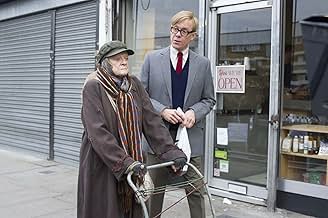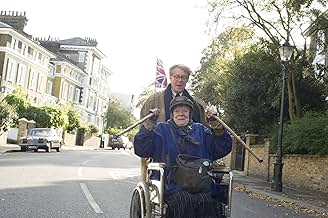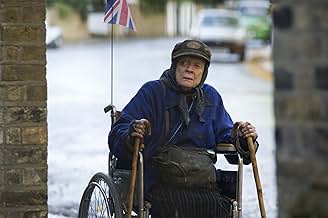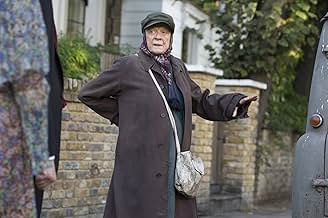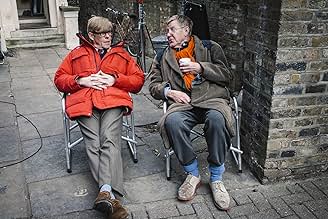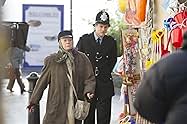AVALIAÇÃO DA IMDb
6,7/10
34 mil
SUA AVALIAÇÃO
Um homem forma um vínculo inesperado com uma mulher que mora em uma van.Um homem forma um vínculo inesperado com uma mulher que mora em uma van.Um homem forma um vínculo inesperado com uma mulher que mora em uma van.
- Indicado para 1 prêmio BAFTA
- 1 vitória e 8 indicações no total
Avaliações em destaque
The film begins with our protagonist Miss Shepherd (Smith) driving through the English countryside hoping to avoid a policeman. There is blood splattered against her cracked windshield and a flustered look on Shepherd's face. We then meet our narrator Alan Bennett (Jennings) a playwright who has just moved to the quiet middle-class neighborhood of Camden. He is of two minds; one who writes fastidiously while the other takes care of the daily functions of his life. The doppelgangers argue about the trajectory of his work, both deciding he lacks the excitement of Hemingway and the complexities of Proust. Then Miss Shepherd moves into the neighborhood, setting her dilapidated van along the street to the horror of Camden's well-to-do residents.
Dame Maggie Smith has had a long and illustrious career to be sure. A consistently tremendous force on the stage and screen, Smith has been in show-business since the 1950's and not once has she faltered with an abysmal performance. The Lady in the Van is certainly no exception. She takes on the role she first popularized on the stage play with gusto relishing in the tiniest little moments that breathe life into Shepherd. So popular was her portrayal on stage that she was nominated for Best Actress at the Olivier Awards and this year she was similarly nominated for a Golden Globe.
Alas The Lady in the Van is not simply about Shepherd and her cantankerous run-ins with neighbors, social workers and Alan. Alan's struggle to come to terms with his sickly mother, his circumspect sexuality and his writing, at one point putting on a monologue on London's West End which goes badly. Alex Jennings tries hard to make his duel role stick but his periodic subplots feel airy, lack conflict and pad time in between Smith's charming homeless-woman stunts and his own droll voice-over narration. He's not a real character or at least one we really care about. He's simply the vessel in which the story carries itself while Smith is the showcase.
While it's easy to see how this film's source material is stage- driven, director Nicholas Hytner does a fine job elevating the story in a more cinematic way. He used his eye to similar aplomb in The Madness of King George (1994) which delved into similar themes albeit in a much grander way. We get a picturesque view of springtime Camden with all the trappings of upper-middle class opulence. In such an environment, Shepherds garish van sticks out like a sore thumb jabbing at the neighbors sensibilities. Despite the main conflict surrounding what the neighborhood should to with their local reprobate, none of them are treated as outright monsters. The film takes place within a 15-year time span thus what eventually becomes a nuisance morphs into a local mainstay.
There's one piece of The Lady in the Van puzzle that must be addressed and that is the outstanding score by five time Oscar nominee George Fenton. His original music is grand and bittersweet which perfectly matches the emotional core of the film. He borrows some insightful leitmotifs from Shostakovich and Tchaikovsky while also presenting some specific pieces by Schubert and Chopin. One particular piece; an impromptu by Schubert does such a good job portraying the sadness and sense of guilt of Miss Shepherd, that it ranks up there with the Chopin ballad scene in The Pianist (2002) as best example of classical music translating character emotion.
Yet in spite of some stellar music, one showstopping performance on the part of Maggie Smith and a kindly message about transience, The Lady in the Van can't help but feel almost too sweet. It's a movie that will put a warm smile on your face and keep it there but it won't stick with you long after you've left the theater. That's not altogether a bad thing though; if you're craving for some wholesome entertainment sure to warm your heart, The Lady in the Van is certainly worth your time.
Dame Maggie Smith has had a long and illustrious career to be sure. A consistently tremendous force on the stage and screen, Smith has been in show-business since the 1950's and not once has she faltered with an abysmal performance. The Lady in the Van is certainly no exception. She takes on the role she first popularized on the stage play with gusto relishing in the tiniest little moments that breathe life into Shepherd. So popular was her portrayal on stage that she was nominated for Best Actress at the Olivier Awards and this year she was similarly nominated for a Golden Globe.
Alas The Lady in the Van is not simply about Shepherd and her cantankerous run-ins with neighbors, social workers and Alan. Alan's struggle to come to terms with his sickly mother, his circumspect sexuality and his writing, at one point putting on a monologue on London's West End which goes badly. Alex Jennings tries hard to make his duel role stick but his periodic subplots feel airy, lack conflict and pad time in between Smith's charming homeless-woman stunts and his own droll voice-over narration. He's not a real character or at least one we really care about. He's simply the vessel in which the story carries itself while Smith is the showcase.
While it's easy to see how this film's source material is stage- driven, director Nicholas Hytner does a fine job elevating the story in a more cinematic way. He used his eye to similar aplomb in The Madness of King George (1994) which delved into similar themes albeit in a much grander way. We get a picturesque view of springtime Camden with all the trappings of upper-middle class opulence. In such an environment, Shepherds garish van sticks out like a sore thumb jabbing at the neighbors sensibilities. Despite the main conflict surrounding what the neighborhood should to with their local reprobate, none of them are treated as outright monsters. The film takes place within a 15-year time span thus what eventually becomes a nuisance morphs into a local mainstay.
There's one piece of The Lady in the Van puzzle that must be addressed and that is the outstanding score by five time Oscar nominee George Fenton. His original music is grand and bittersweet which perfectly matches the emotional core of the film. He borrows some insightful leitmotifs from Shostakovich and Tchaikovsky while also presenting some specific pieces by Schubert and Chopin. One particular piece; an impromptu by Schubert does such a good job portraying the sadness and sense of guilt of Miss Shepherd, that it ranks up there with the Chopin ballad scene in The Pianist (2002) as best example of classical music translating character emotion.
Yet in spite of some stellar music, one showstopping performance on the part of Maggie Smith and a kindly message about transience, The Lady in the Van can't help but feel almost too sweet. It's a movie that will put a warm smile on your face and keep it there but it won't stick with you long after you've left the theater. That's not altogether a bad thing though; if you're craving for some wholesome entertainment sure to warm your heart, The Lady in the Van is certainly worth your time.
Maggie Smith never disappoints. She is such an amazing actress and continues to be in "The Lady in the Van." Such an interesting true story of a very odd woman, this film is very endearing. The chemistry between Maggie Smith and Alex Jennings is very enjoyable to watch. Their relationship had a sort of codependency between them that was really fueled by a real caring for each other for different reasons. Director Nicholas Hytner did a great job of portraying the comedy found in this story. And that is due to the great acting of Maggie Smith, whom I cannot say enough about. Her recent Golden Globe nomination for Best Actress in a Motion Picture- Comedy was well deserved and although she didn't take home the trophy, her performance is still one to be heavily applauded.
Like all the best English comedies, the humor in "The Lady in the Van" is founded on character and in eccentricity but then we should expect nothing less from the pen of the great Alan Bennett. This is mostly a true story we are told and it's the story of a very eccentric lady and one, or is it two, quite eccentric men. The lady is Mary, or is it Margaret, Shepherd who might be considered homeless were it not for the van she lives in. The somewhat eccentric man is Bennett himself. I said two because in this case we get two Bennetts for the price of one, Alan the writer and Alan the householder and they are both played by Alex Jennings.
Miss Shepherd really existed and she's the lady who, at Bennett's request. moved her van from the street outside his house, where she had parked it, into his driveway. Initially she was due to stay a few months but ended up parking there for 15 years. Bennett turned the story of her stay first into a novella and then into a play and now, under the direction of Nicholas Hytner, into a film and a beautiful job he's made of it.
Of course, for the purpose of dramatic and comic effect Mr Bennett has taken liberties, adding bits here and there including a delightful phantasmagorical ending. He also surrounds himself and Miss Shepherd with a host of other characters, some almost as eccentric as they are. Recreating the part she played on stage Maggie Smith is magnificent in the title role. Of course, you could say Maggie has been playing variations of Jean Brodie for the past 45 years. It's easy to see Miss Brodie in the put-downs of the Dowager, Countess of Grantham had Jean been born into a different generation or class and it's not much of a step to see Miss Shepherd as an older, very much down-on-her-luck Jean Brodie. A third Oscar is certainly not out of the question.
Jennings, too, has Bennett off to a tee and there's lovely support from the likes of Frances De La Tour, Roger Allam and Deborah Findlay as sundry neighbors while the entire cast of Bennett's "The History Boys" manage to pop up in one form or another. If it feels slighter than some of Bennett's other offerings it may simply be because here he is writing about someone we would probably pass in the street without looking twice at. Of course, if on meeting Miss Shepherd in the street we knew what we know now, we might indeed give her a second or even a third glance; we might even invite her to move her van into our driveway. Slight? Not a bit of it.
Miss Shepherd really existed and she's the lady who, at Bennett's request. moved her van from the street outside his house, where she had parked it, into his driveway. Initially she was due to stay a few months but ended up parking there for 15 years. Bennett turned the story of her stay first into a novella and then into a play and now, under the direction of Nicholas Hytner, into a film and a beautiful job he's made of it.
Of course, for the purpose of dramatic and comic effect Mr Bennett has taken liberties, adding bits here and there including a delightful phantasmagorical ending. He also surrounds himself and Miss Shepherd with a host of other characters, some almost as eccentric as they are. Recreating the part she played on stage Maggie Smith is magnificent in the title role. Of course, you could say Maggie has been playing variations of Jean Brodie for the past 45 years. It's easy to see Miss Brodie in the put-downs of the Dowager, Countess of Grantham had Jean been born into a different generation or class and it's not much of a step to see Miss Shepherd as an older, very much down-on-her-luck Jean Brodie. A third Oscar is certainly not out of the question.
Jennings, too, has Bennett off to a tee and there's lovely support from the likes of Frances De La Tour, Roger Allam and Deborah Findlay as sundry neighbors while the entire cast of Bennett's "The History Boys" manage to pop up in one form or another. If it feels slighter than some of Bennett's other offerings it may simply be because here he is writing about someone we would probably pass in the street without looking twice at. Of course, if on meeting Miss Shepherd in the street we knew what we know now, we might indeed give her a second or even a third glance; we might even invite her to move her van into our driveway. Slight? Not a bit of it.
At the bottom of the poster it says: 'This is a mostly true story.' Nicholas Hytner directs a 'revisionist' take on Miss Shepherd, the tramp-like old biddy who parked her van in Alan Bennett's front drive for a few weeks that turned into 15 years. The movie version fleshes out her story with glimpses of her past (a convent, a piano recital, a family feud, a fatal accident) which the narrator (one of the two Alan Bennetts played by Alex Jennings) tells us he only found out after she died.
A woman in front of me whispered to her companion, who wondered why Alan Bennett had a twin, that he actually had a split personality. That's not a bad explanation for the device of the householder Alan who puts up with Miss Shepherd (and clears her mess from his drive) and the writer Alan who doesn't think there's a story in this. I'm not sure that the double-act is entirely effective or necessary: a voice-over from the real Alan would have worked just as well, wouldn't it?
Despite the attempts to give the Lady a life before the Van, the screenplay is more revealing about the playwright, the reluctant Samaritan who is also having to deal with his northern mother's journey down the road to dementia. There are even a few references to the fact that Mr Bennett's sexuality was being questioned for many years before he finally outed himself.
The movie has more pace than the book and the play did. Maggie Smith is of course simply magnificent, fully absorbed into the grimy skin of this unlovable old harridan. Her performance is pitched midway between the Duchess of Downton and Muriel from the Marigold Hotel, although the character preposterously blends Hyacinth Bucket with Victor Meldrew. The 'History Boys', who largely owe their careers to Mr Bennett, pop up in a series of cameos, along with Frances de la Tour and Stephen Campbell-Moore from the same play. Jim Broadbent's scrounger is the least convincing presence and is perhaps mostly untrue.
This looks like being another highly competitive year for Oscars and BAFTAs, but Dame Maggie is certain to be a contender and could well be a winner. THE LADY IN THE VAN is not pitch-perfect in the way that THE HISTORY BOYS was (and the first - best - MARIGOLD HOTEL), but it is another master-class exemplar of British writing, acting and film- making.
A woman in front of me whispered to her companion, who wondered why Alan Bennett had a twin, that he actually had a split personality. That's not a bad explanation for the device of the householder Alan who puts up with Miss Shepherd (and clears her mess from his drive) and the writer Alan who doesn't think there's a story in this. I'm not sure that the double-act is entirely effective or necessary: a voice-over from the real Alan would have worked just as well, wouldn't it?
Despite the attempts to give the Lady a life before the Van, the screenplay is more revealing about the playwright, the reluctant Samaritan who is also having to deal with his northern mother's journey down the road to dementia. There are even a few references to the fact that Mr Bennett's sexuality was being questioned for many years before he finally outed himself.
The movie has more pace than the book and the play did. Maggie Smith is of course simply magnificent, fully absorbed into the grimy skin of this unlovable old harridan. Her performance is pitched midway between the Duchess of Downton and Muriel from the Marigold Hotel, although the character preposterously blends Hyacinth Bucket with Victor Meldrew. The 'History Boys', who largely owe their careers to Mr Bennett, pop up in a series of cameos, along with Frances de la Tour and Stephen Campbell-Moore from the same play. Jim Broadbent's scrounger is the least convincing presence and is perhaps mostly untrue.
This looks like being another highly competitive year for Oscars and BAFTAs, but Dame Maggie is certain to be a contender and could well be a winner. THE LADY IN THE VAN is not pitch-perfect in the way that THE HISTORY BOYS was (and the first - best - MARIGOLD HOTEL), but it is another master-class exemplar of British writing, acting and film- making.
"Lady in the Van" from 2015 is the "mostly" true story of playwright Alan Bennett's relationship with a woman who lived in various vans parked in his driveway for fifteen years. Bennett here is played by Alex Jennings, and the lady, Miss Shepherd, Maggie Smith.
Miss Shepherd, who smells awful from not bathing, lives in a crowded van and moves it from place to place, staying until she's thrown out or until she hears music. When she's told to move or do something else, she yells, as only Maggie Smith can do, "I'm a sick woman! Dying possibly!" Alan finds it impossible to break from her, though he tries. She prays very fervently and one time tells him that she spoke to the Virgin Mary at the post office. When he asks if the van is insured, she says she doesn't need it, she's insured in heaven. "So what happens if you have an accident?" Alan asks. "Who pays? The Pope?"
Alan is gay, though his friends are always trying to fix him up with a woman. One day Miss Shepherd says, "All those people who come and go in the dark, I know who they are." "Oh, Jesus," he says under his breath. "They're Communists!" she hisses. "Otherwise they wouldn't come and go in the dark."
Miss Shepherd is a woman of mystery - Alan finally learns that she studied piano, speaks fluent French, and was a nun. She also at times is seen going to someone's house in the dead of night. A man opens the door and comes outside. And someone stops by her van from time to time, and she gives him money.
In the end, we learn who these people are, her story of the convent, the history of her piano-playing, why she prays all the time, and who the men are.
Alex Jennings is perfect as Bennett (who appears at the end of the movie). He has his voice down pat, and in the film, there are two Alans - the writer Alan and the observer Alan, who talk with one another throughout the film. It's Alan who lives in the real world who encourages the writer Alan to be helpful to Miss Shepherd.
I am so privileged to have seen Maggie Smith in "Lettice and Lovage," one of my greatest evenings in the theater, where I laughed until I cried. At the end of that play, she gets on the phone and does a serious, touching monologue. She does the same here. Instead of the crazy homeless lady with the plastic bags we see and laugh at and wonder about during the play, she does a monologue that tells us who she is, and about her pain, heartbreak, and disappointments. "Why did you choose to be homeless?" Alan asks. "I didn't choose," she insists. "It was chosen for me."
A wonderful film about an uptight, cold man and a disturbed religious bag lady - you won't soon forget it.
Miss Shepherd, who smells awful from not bathing, lives in a crowded van and moves it from place to place, staying until she's thrown out or until she hears music. When she's told to move or do something else, she yells, as only Maggie Smith can do, "I'm a sick woman! Dying possibly!" Alan finds it impossible to break from her, though he tries. She prays very fervently and one time tells him that she spoke to the Virgin Mary at the post office. When he asks if the van is insured, she says she doesn't need it, she's insured in heaven. "So what happens if you have an accident?" Alan asks. "Who pays? The Pope?"
Alan is gay, though his friends are always trying to fix him up with a woman. One day Miss Shepherd says, "All those people who come and go in the dark, I know who they are." "Oh, Jesus," he says under his breath. "They're Communists!" she hisses. "Otherwise they wouldn't come and go in the dark."
Miss Shepherd is a woman of mystery - Alan finally learns that she studied piano, speaks fluent French, and was a nun. She also at times is seen going to someone's house in the dead of night. A man opens the door and comes outside. And someone stops by her van from time to time, and she gives him money.
In the end, we learn who these people are, her story of the convent, the history of her piano-playing, why she prays all the time, and who the men are.
Alex Jennings is perfect as Bennett (who appears at the end of the movie). He has his voice down pat, and in the film, there are two Alans - the writer Alan and the observer Alan, who talk with one another throughout the film. It's Alan who lives in the real world who encourages the writer Alan to be helpful to Miss Shepherd.
I am so privileged to have seen Maggie Smith in "Lettice and Lovage," one of my greatest evenings in the theater, where I laughed until I cried. At the end of that play, she gets on the phone and does a serious, touching monologue. She does the same here. Instead of the crazy homeless lady with the plastic bags we see and laugh at and wonder about during the play, she does a monologue that tells us who she is, and about her pain, heartbreak, and disappointments. "Why did you choose to be homeless?" Alan asks. "I didn't choose," she insists. "It was chosen for me."
A wonderful film about an uptight, cold man and a disturbed religious bag lady - you won't soon forget it.
Você sabia?
- CuriosidadesThis movie was shot in the actual house on the street where the events took place, Gloucester Crescent in Camden Town. Some of the same people still lived there when the star prop arrived, decades later.
- Erros de gravaçãoMargaret/Mary is shown parking her new Commer van in the drive of Alan Bennett's house and she pulls up on the handbrake in the middle of the van, where a handbrake would normally be. In fact Commer vans had their handbrake to the right of the driver's seat between the seat and the door - not between the two front seats.
- Citações
Rufus: Sorry, you can't park here.
Miss Shepherd: No, I've had guidance. This is where it should go.
Rufus: Guidance? Who from?
Miss Shepherd: The Virgin Mary. I spoke to her yesterday. She was outside the post office.
Rufus: What does she know about parking?
- Cenas durante ou pós-créditosDuring the first part of the credits, a young Margaret can be seen playing the piano at her concert in King's Hall.
- ConexõesFeatured in Alan Bennett at 80: Bennett Meets Hytner (2014)
- Trilhas sonorasPiano Concerto No. 1 In E Minor, OP. 11
Written by Frédéric Chopin
Performed by Clare Hammond and BBC Concert Orchestra
Orchestra Leader Charles Mutter
[The principal piano piece that recurs throughout the film is Chopin's Piano Concerto 1, using both the slow middle (second) movement "romanza" and the quick final (third) movement "rondo". Alfred Cortot was especially associated with playing Chopin's piano oeuvre.]
Principais escolhas
Faça login para avaliar e ver a lista de recomendações personalizadas
- How long is The Lady in the Van?Fornecido pela Alexa
Detalhes
- Data de lançamento
- Países de origem
- Central de atendimento oficial
- Idiomas
- Também conhecido como
- The Lady in the Van
- Locações de filme
- 23 Gloucester Crescent, London, Greater London, Inglaterra, Reino Unido(Alan Bennett's house where the events actually occurred)
- Empresas de produção
- Consulte mais créditos da empresa na IMDbPro
Bilheteria
- Orçamento
- US$ 6.000.000 (estimativa)
- Faturamento bruto nos EUA e Canadá
- US$ 10.021.175
- Faturamento bruto mundial
- US$ 41.387.687
- Tempo de duração1 hora 44 minutos
- Cor
- Mixagem de som
- Proporção
- 1.85 : 1
Contribua para esta página
Sugerir uma alteração ou adicionar conteúdo ausente

Principal brecha
By what name was A Senhora da Van (2015) officially released in India in Hindi?
Responda






